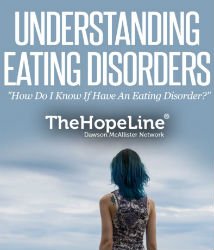Who is at risk?
Anybody can develop an eating disorder, although there are some groups of people who have a higher risk.
Females
Over 90% of people who are identified as having an eating disorder are female, however they are becoming increasingly more common in the male population.
Teenagers
Anorexia and Bulimia commonly begin in the teens, although cases have been recorded in children as young as six years old. Anorexia often begins in teens aged 13-18 while bulimia often starts later, in the late teens or early twenties.
Particular Families
While once eating disorders were mainly only seen in middle to upper class families who were extremely close and over protective this is not so much the case anymore and eating disorders are seen in all socio-economic groups and all types of families. However, there is an increased risk if a parent or sibling has had an eating disorder, mood disorder or substance abuse and dependence.
Particular Countries or Ethnic groups
Eating disorders are more prevalent in industrialised societies where there is an abundance of food and where there is a cultural ideal for women to be thin. While this tendered to occur in mainly white societies, eating disorders are now occurring in almost every culture and ethnic group.
Growing up in a society that places a high value on women being thin
Societies which believe women should be thin often give out very conflicting and confusing messages to young women about their size, food, diets and health and the roles they should have. These conflicting messages can contribute to the development of an eating disorder.
Particular Groups of Individuals
Eating disorders are more common in adolescent females and young women, women at university, individuals in sports or professions where there is a high value on being thin (eg. ballet, gymnastics, modelling).
Individual Characteristics
Eating Disorders do tend to be more common (although not exclusive) in people who:
- Are perfectionists – both physically and academically
- Have low self-esteem
- Have high body dissatisfaction – don’t like the way they look
- Have difficulty naming their emotions
- Have periods of depression
Sexual Abuse
Being sexually abused as a child is a significant predictor of developing an eating disorder.
Dieting Behaviour
While not every dieter will develop an eating disorder, nearly every eating disorder began with some kind of attempt at weight loss or diet. While there are some features which may be common to people with eating disorders it is important to remember that they can happen to anyone and you usually can’t tell just by looking at them.










Recent Comments